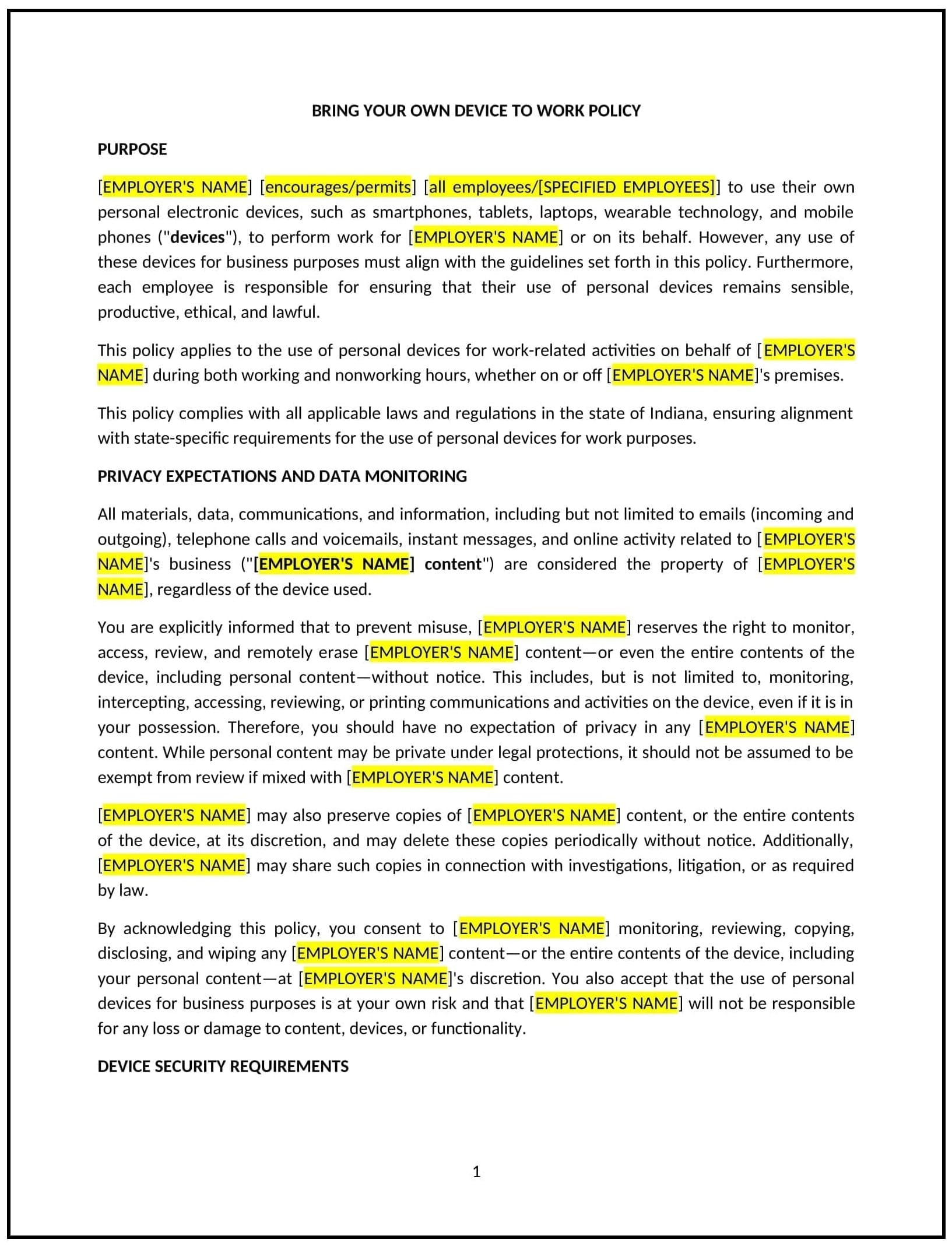Bring your own device to work policy (Indiana): Free template
Got contracts to review? While you're here for policies, let Cobrief make contract review effortless—start your free review now.

Customize this template for free
Bring your own device to work policy (Indiana): Free template
The bring your own device (BYOD) to work policy helps Indiana businesses outline guidelines for employees who use their personal devices, such as smartphones, laptops, or tablets, for work purposes. This policy ensures that employees can use their devices while protecting the security of company data and maintaining productivity. By using this template, businesses can set clear expectations for device usage, safeguard sensitive information, and maintain a secure work environment.
By implementing this policy, Indiana businesses can increase flexibility for employees while mitigating the risks associated with personal device usage, thus balancing convenience with data security.
How to use this bring your own device to work policy (Indiana)
- Define eligible devices: Clearly state which devices are eligible for use under the BYOD policy, including smartphones, tablets, and laptops. The policy should specify any restrictions on certain devices or operating systems that may not meet the business’s security standards.
- Outline acceptable usage: Specify what employees can and cannot do on their personal devices when used for work purposes. This may include restrictions on installing certain applications, using devices for personal purposes during work hours, or accessing specific company networks or data.
- Address security measures: Outline the security requirements for personal devices, such as the use of strong passwords, encryption, and security software. The policy should specify what actions employees must take to safeguard company data, including the use of virtual private networks (VPNs) or other secure access methods.
- Provide guidelines for remote access: If employees use their personal devices to work remotely, specify the guidelines for accessing company systems, such as the use of secure connections and authentication methods to protect data.
- Clarify responsibilities: Define the responsibilities of both the employer and the employee regarding device maintenance, including updating software, managing device security, and reporting lost or stolen devices. The policy should also address who is responsible for any costs related to the use of personal devices for work.
- Address data privacy: Specify how company data should be handled on personal devices, including guidelines for data storage, access, and removal of company data when the employee leaves the company or no longer uses the device for work.
- Define consequences for non-compliance: Outline the consequences for employees who fail to follow the BYOD policy, such as revocation of BYOD privileges, disciplinary action, or termination of employment.
Benefits of using this bring your own device to work policy (Indiana)
Implementing this policy provides several key benefits for Indiana businesses:
- Increases flexibility and productivity: Allowing employees to use their personal devices gives them more flexibility and can help increase productivity by enabling them to work more efficiently from various locations.
- Enhances employee satisfaction: Employees often prefer using their personal devices, as it allows them to work with technology they are already familiar with, leading to higher job satisfaction and engagement.
- Reduces costs: By leveraging employees’ personal devices, businesses can reduce the need for company-provided devices, which can lower hardware and maintenance costs.
- Protects sensitive information: The policy ensures that the use of personal devices does not compromise the security of company data, as it includes requirements for encryption, secure connections, and other protective measures.
- Promotes a secure and compliant environment: The policy helps businesses manage the risks associated with BYOD practices, including potential data breaches or unauthorized access to company systems, ensuring that appropriate security measures are in place.
Tips for using this bring your own device to work policy (Indiana)
- Communicate the policy clearly: Ensure that all employees understand the BYOD policy and the security measures they must take when using their personal devices for work. Include the policy in the employee handbook, onboarding materials, and during training.
- Monitor device security: Regularly check that employees are following the security requirements set out in the policy, such as keeping software up to date, using encryption, and accessing company systems securely.
- Offer support for employees: Provide support to employees in setting up their personal devices for work, such as offering assistance with installing required security software or configuring access to company networks.
- Review the policy regularly: Regularly review the BYOD policy to ensure it is up-to-date with the latest security best practices and compliance requirements. The policy should also adapt to changes in technology, such as new devices or software updates.
- Address device loss or theft promptly: Specify a procedure for reporting lost or stolen devices, and outline the steps that must be taken to secure company data in the event of a security breach.